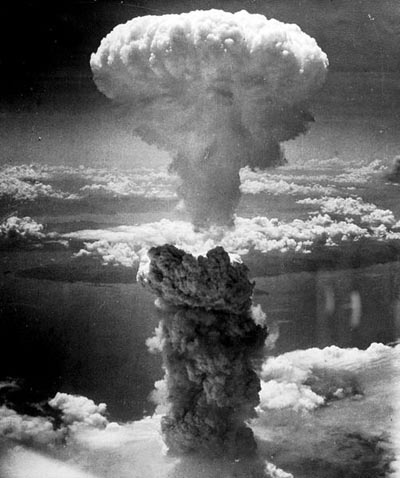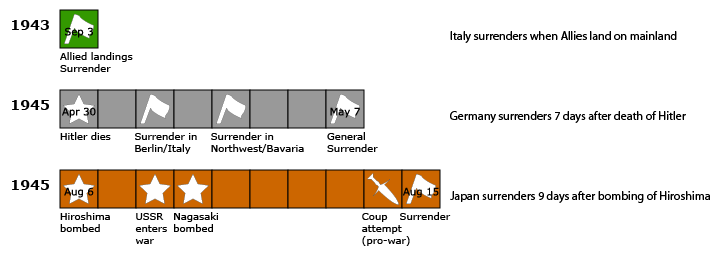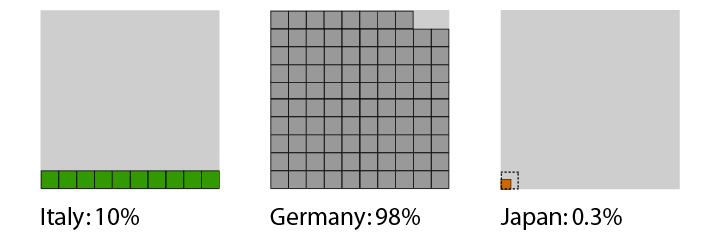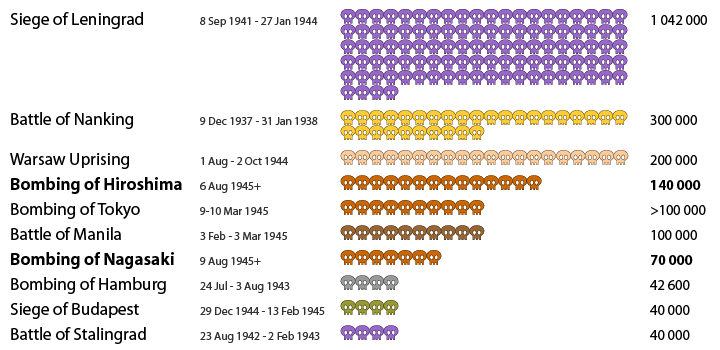
Figure 1. Atomic bombing of Nagasaki
The decision to use the atomic bomb on Hiroshima and Nagasaki was controversial from the very start. This controversy has only increased as the memory of the Second World War has begun to fade, especially given that education systems generally put more emphasis on the suffering caused by the bombs than the reasons for using them (quite rightfully, in my opinion).
Personally, I believe the use of the atomic bombs helped end the war and prevent millions of further deaths. However, in the following article I will try as much as possible to avoid drawing conclusions and simply present the facts. Naturally, many of the statistics given here can be debated - to avoid cherry-picking I have simply used the general figures provided in wikipedia. The only exception is the Soviet invasion of Manchuria, where I have used the civilian and prisoner casualty figures from John Dower's Embracing Defeat: Japan in the Wake of World War II (see here).
Was Japan about to Surrender?
Japan was trying to negotiate an end to the war, but its last terms given prior to the dropping of the bomb were completely unrealistic. These were delivered to the Soviet Union on July 21, 1945, in the hope it would act as a peace broker. They asked for the neutralization of Manchuria, the Japanese retention of Korea and Taiwan, no occupation of the Japanese home islands and the maintenance of the power of the Emperor. All these points were unacceptable to the Allies, who openly demanded unconditional surrender.
Comparison of Axis surrenders

Figure 2. Comparative timeline of Axis power surrenders
Each of the Axis powers surrendered differently. Italy, which was basically waiting for the arrival of Allied troops before it was willing to stand up to the Germans, surrendered at the first opportunity. Germany surrendered only after massive territorial loss, the death of its leader, the loss of its capital and mass troop surrenders.
Japan's surrender, by contrast, was an entirely top-down affair, hesitantly managed by the Emperor and the political elite. There were no mass troop surrenders or significant acts of dissent, with the sole exception of a last minute coup attempt to prevent Japan surrendering.
Prior Surrenders of Axis Troops

Figure 3. Surrenders per military death by war end for Axis powers
Towards the end of their respective wars, vast numbers of Italian and German troops had already surrendered. The Japanese, however, persisted, with no mass surrenders until after the Emperor's proclamation.
Military forces at time of Surrender

Figure 4. Size of military forces for each Axis power at time of surrender
This lack of surrenders is reflected in the size of the Japanese military at the time of the surrender, which in sharp contrast to the other Axis powers was roughly at peak strength (in quantity, although certainly not quality, of troops).
Home population under occupation at time of surrender

Figure 5. Percentage of home population under occupation for each Axis power at time of surrender
A final point of contrast between the three powers is that the Japanese homeland was virtually free from enemy occupation when it surrendered, whereas even Italy only packed in after a major invasion.
Did using the Bomb save lives?
If Japan was not about to surrender when the atomic bombs were dropped, did they save lives? Or would a more patient approach by the Allies have been more humane? Let's compare the atomic bombings to the other deaths in the last weeks of the war.
Comparison of end of war deaths

Figure 6. War deaths occurring at the end of the Asia-Pacific War (Aug 6 - Sep 2, 1945)
The deaths from the Hiroshima and Nagasaki bombings formed a significant part of the total war deaths which occurred between August 6, 1945 and the signing of the Japanese Instrument of Surrender 27 days later. However they were less than either those caused by the Soviet invasion of Manchuria or the other war deaths in the Asia-Pacific region. The latter figure is calculated from an estimated 250 000 dying every month the war continued in 1945. So even if we assume Japan would have surrendered without a fight once the Allies landed in October, the abrupt end of the war still saved lives.
What about the Soviet invasion?
But were the atomic bombs still unnecessary? Could the Soviet invasion by itself have ended the war? We will never know for sure, but it's worth pointing out that, given their weakness at sea, the Soviet offensive was never a direct threat to Japan or its leadership in the way the atomic bomb was.
And if we're going to go by hindsight, maybe it would have been better, from the US perspective, to forgo the Soviet invasion over Hiroshima and Nagasaki. After all, the former killed more people and set up the conditions for both the Chinese Communist takeover and the Korean War.
Was the Atomic Bomb fundamentally immoral?
From the start, many have questioned the morality of using atomic bombs against Hiroshima and Nagasaki, regardless of whether or not they saved lives in the long run. This is a personal and philosophical argument which cannot be countered with facts and figures. However I would like to make three points:
- Had any of the major combatants in World War II gained access to the bomb, it seems likely they would have used it at least as enthusiastically as the Americans.
- The use of the bomb on Hiroshima and Nagasaki did not make it an acceptable part of warfare, rather it almost certainly contributed to its taboo status.
- War is horrific. Personally I'm not convinced that killing a number of people with nuclear weapons is any worse than killing the same number of people with conventional means.
Those points out of the way, the only way I see of addressing the moral issue is by comparing the deaths caused by the bombs to the other deaths in the war. Needless to say, the destruction wrought by the atomic bombs pales into insignificance next to the more than 30 million killed in the Asia-Pacific War, or even the 3 million Japanese who died in that conflict. But how did they compare to conventional attacks?
Comparison of bombing deaths

Figure 7. Civilian deaths caused by 5 most lethal bombing raids in WWII (immediate impact only)
Although Hiroshima and Nagasaki rank high in the most lethal bombing raids, they are not exceptional. The firebombing of Tokyo, for instance, was directly responsible for more deaths than Hiroshima.
Comparison of civilian battle deaths

Figure 8. Civilian deaths caused by 10 most lethal urban battles and raids in WWII (including after effects)
The above chart shows civilian deaths due to battles and raids localized around individual cities. Atrocities which do not fit this criteria but can be compared as distinct events include the German operation of Auschwitz death camp (1.1 million killed) and the Nationalist Chinese diversion of the Yellow River in 1938 (800 000 drowned). Again, the atomic bombs are significant but far from exceptional in the devastation they caused.